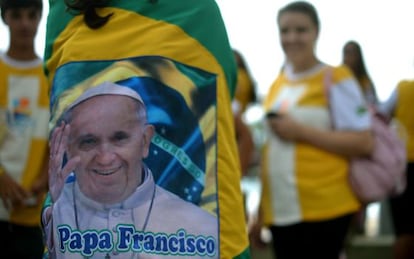Pope Francis to launch his “social gospel” program from Brazil
Francis has chosen his home continent as the platform for his message to millions of young people


Pope Francis, the first non-European pontiff and the first pope to come from the Americas will arrive in Brazil next week where he will launch a revolutionary agenda based on the so-called “social gospel.” Francis, who did not come from the inner circle of the Church, has chosen the continent from which he came as the platform for his message. The pope will deliver remarks to millions of young people gathered at the World Youth Forum in Rio de Janeiro.
During his week-long visit to Brazil, the popewill speak to all those who are marginalized and humiliated. He will make a special note on emerging economies and the temptation to put resources into the hands of those who need them the least. Despite its economic advances, Brazil, the world’s largest Roman Catholic country, still suffers from great social inequalities.
Sources close to the pontiff say that this trip is important to him because he plants to unveil his official agenda. Some 6,000 journalists from all over the world are expected to cover the events.
In his first four months in office, Pope Francis made declarations indicating that his focus will be on those forgotten, the marginalized. He has asked that the Church not only care for the poor but also that its members take a vow of poverty. The pope expressed sadness when he learned that some Vatican prelates drive luxury cars. He has criticized "the tyranny of money" and "the globalization of indifference" towards the suffering.
Francis has gradually put aside the symbols of power that had distanced the office of the pope from the bishops for centuries. He does not refer to himself as "pope." He sees himself as the bishop of Rome, which is one of his titles.
Some analysts say that the face of Catholicism in Latin America will change after the pope unveils his vision for the Church next week in Brazil.
Those who believe that the Pope is going to Brazil to "halt the advent of evangelicals" in Catholic territory are missing the point. Pope Francis has a much greater plan for the Church - one that will serve as an incentive for all other faiths. In fact the pontiff plans to hold an interfaith forum in Rome in the near future.
The vision he has dreamed of the Church is not based on ancient theology or even on the liberation theology that developed in Latin America as an antidote to social injustices. Liberation theology was based on the ideas Marx put forth in Das Kapital. The revolution that Pope Francis wants to start comes from a 200-year-old Christianity. It comes from the prophecy of Jesus who proclaimed good fortune for the poor, the hungry, those in need of justice, and the peacemakers. Francis’ theology is the “social gospel” of Christianity. It’s not ideological; it’s practical.
A few weeks ago the pope hinted at what will be his message when he talked about the plight of the illegal immigrants who risk their lives in search of work. "Who cries for them?" he asked.
In Rio, artists have organized a prayer and song retreat on the idyllic Copacabana beach for the pope's arrival. Sources close to the papacy have said that the pope will speak about what he believes are "the new wounds" the Savior bears for the social injustices that exist alongside opulent consumerism.
"Your brother suffers because he is hungry, thirsty, naked, humiliated. Because he is a slave in chains, or languishing in a hospital bed," Francis said in a speech two weeks ago. "These are the pains Jesus bears today," he added. Such is the new social revolution Francis envisions - one with fewer theological and ideological overtures and stronger roots in solidarity.
According to bishops in Brazil, the pontiff's sermon will reach both the believers and non-believers. It will speak to those who find inspiration in Jesus' Beatitudes and believers of other faiths. Given his message it's not surprising that the pope has said that he stands by the thousands of young protesters who have taken to the streets to demand greater social justice and better quality of life in Brazil.
The pontiff has asked to travel without bullet-proof windows or armor as he greets people in the streets. He wants to look into their eyes without barriers or armed men at his side. He has told his friend, the Argentine rabbi Abraham Skorka that he does not fear death.
Translation: Dyane Jean François
Tu suscripción se está usando en otro dispositivo
¿Quieres añadir otro usuario a tu suscripción?
Si continúas leyendo en este dispositivo, no se podrá leer en el otro.
FlechaTu suscripción se está usando en otro dispositivo y solo puedes acceder a EL PAÍS desde un dispositivo a la vez.
Si quieres compartir tu cuenta, cambia tu suscripción a la modalidad Premium, así podrás añadir otro usuario. Cada uno accederá con su propia cuenta de email, lo que os permitirá personalizar vuestra experiencia en EL PAÍS.
¿Tienes una suscripción de empresa? Accede aquí para contratar más cuentas.
En el caso de no saber quién está usando tu cuenta, te recomendamos cambiar tu contraseña aquí.
Si decides continuar compartiendo tu cuenta, este mensaje se mostrará en tu dispositivo y en el de la otra persona que está usando tu cuenta de forma indefinida, afectando a tu experiencia de lectura. Puedes consultar aquí los términos y condiciones de la suscripción digital.








































